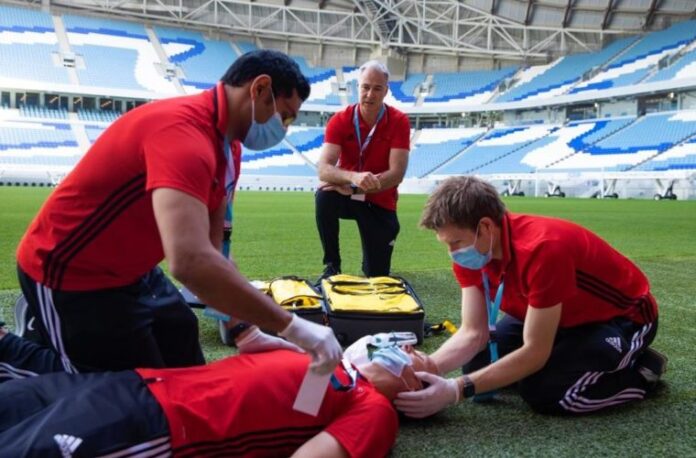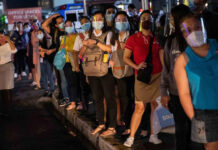FIFA has delivered the first in a series of pitch-side emergency courses and assessments for medical personnel at the upcoming FIFA World Cup Qatar 2022, to implement a standardised and choreographed approach between stakeholders at the tournament and all future FIFA events.
The two-day Emergency Medicine Advanced Level course was delivered at Al Janoub Stadium, a FIFA World Cup venue, and was attended by 16 senior medical professionals from entities across Qatar. It forms part of an ongoing commitment from FIFA to deliver world-class training to all staff tasked with ensuring players’ welfare. The course provides all pitch-side medical staff with the information they need in an on-pitch emergency and the opportunity to practice working in unison with each other.
FIFA Medical Director, Dr. Andrew Massey, explained:
“We can do as much preparation as we can, as much screening, but sometimes emergencies still happen. We want to be in the best possible position to provide the highest level of healthcare to those involved in the matches. This is done through education and training at events such as this to ensure the there is a seamless approach to on pitch management of emergencies. The FIFA Emergency Medicine Courses encourage aim to provide the optimal level of training for all medics working at FIFA tournaments.”
Image Credit: Qatar News Agency
The bespoke course is part of a suite provided by FIFA, covering three levels; advanced, foundation and refresher. In the lead-up to the World Cup further sessions will be delivered, including another in Doha in June 2022 with the team doctors from the 32 qualified nations.
Of those in attendance at Al Janoub Stadium, were senior staff leading and training sub-divisions within their teams. Upon passing the assessment, they will go on to deliver the exact training presented at the FIFA course.
Among the pitch-side medical personnel at every FIFA World Cup game in 2022 will be the national team doctors, a FIFA doctor, and the field of play recovery teams.
Course Director, Dr. Jonny Gordon, further explained the methodologies. He said:
“Under pressure it is possible to deviate from structure. We’ve created a set-piece analogy, which is akin to what the players do. It’s a scripted response so that everybody behaves in a certain way each time, and they know where they should be and how they should interact with each other every time. That then hopefully minimises the stress of the situation for all involved, including the player.”
“Serious things are rare in football, but when they do happen, it creates angst and panic. Not just among the players who are upset at seeing their colleague injured or unwell, but doctors don’t do this every day. These courses help settle things make it much more of a standardised and structured process. The set-piece analogy is exactly that. It’s about making sure that everybody knows exactly what their role is.”
Although the training delivered at Al Janoub Stadium was bespoke to the upcoming World Cup, the overriding ambition of the FIFA medical subdivision is to use such large-scale events to help leave a long-lasting and far-reaching legacy. For Dr. Massey, it is not just about the 28 days of football in Qatar, but something far more significant in scale. He said:
“The plan is to deliver these courses at a confederation or national level so that we can give the people who sit the course the tools to disseminate right through the national associations. The World Cup is brilliant, but unfortunately more people die on grassroots football pitches than international pitches. So, these courses are designed to help that dissemination process. To train the trainers, if you will.”
He continued:
“After the World Cup it’s about the knowledge transfer. Going to different regions in the world and inviting people to that central hub, training them to then go out into their communities and share this throughout the levels of football.
“This is an important legacy project for FIFA Medical. The value of implementing a process that may contribute to preventing a serious health incident on a football pitch is immeasurable. Ensuring people have a knowledge of emergency medicine and having the tools available to treat these emergencies, such as automated external defibrillators, is the minimum standard we would hope to see at every football pitch throughout the world. That is the aim, to provide an environment where football can be enjoyed at all levels, is a safe manner. That makes a real difference, and that’s what this is all about.”
Source: Qatar News Agency
Follow us on our social media channels:
@ILQlive
@ILQlive
@ILoveQtr
ILoveQatar









